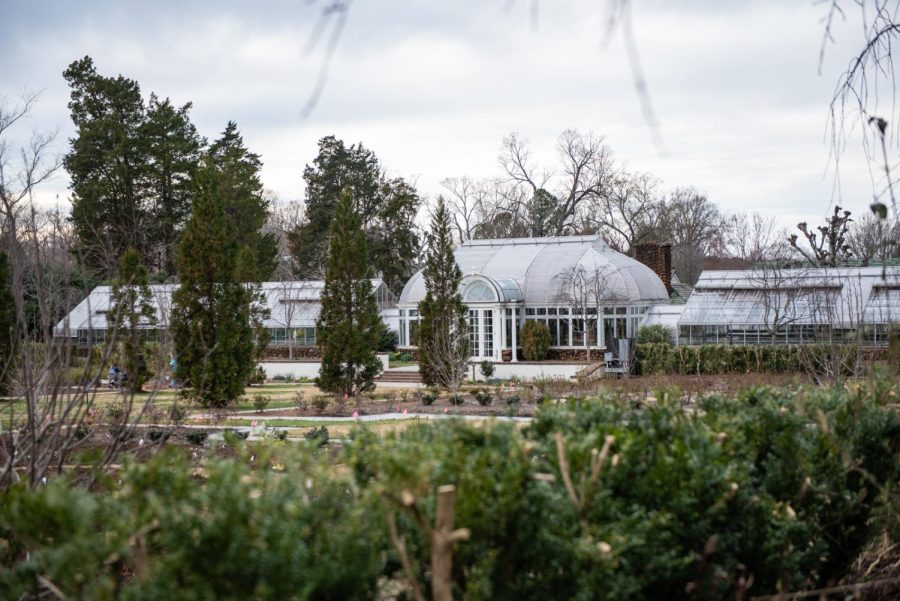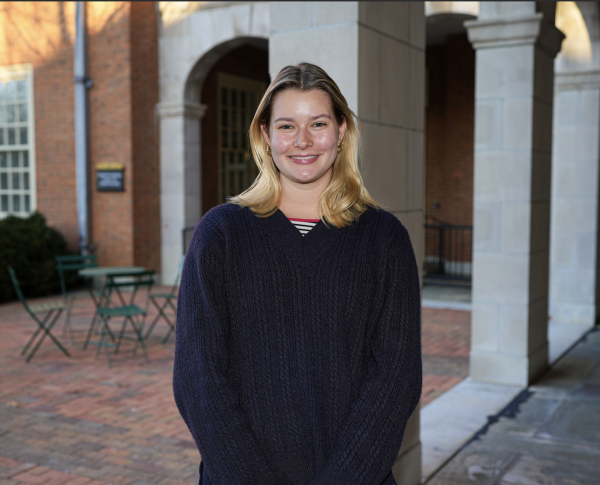A look into Reynolda Gardens’ past, present and future
A deep history surrounds the Reynolda Gardens, which lay just beyond Wake Forest’s campus
Visitors to Reynolda Gardens are treated to its colorful flowers and various plants.
March 2, 2023
A 10-minute walk off campus along the Reynolda Trail leads to a local oasis — Reynolda Gardens. Filled with rich history, Reynolda Gardens’ staff have preserved its value by establishing an upper vegetable garden and flower gardens across the 134 acres of the Reynolda property.
This year, the upper vegetable garden will mirror the work of artist Stephen Towns who is exhibiting at the Reynolda house.
Towns’ exhibit, “Declaration & Resistance,” will be featured this spring from Feb. 18 to May 14. His exhibit reflects the stories of African Americans’ declaration and resistance in America. In conversation with Towns’ art, Reynolda Gardens will incorporate the recurring themes of Towns’ work.
“In [Towns’] artwork, he does a lot of quilts and always uses halos and butterflies,” said Reynolda Gardens’ lead horticulturist Michelle Hawks. “I decided this year that we are going to duplicate that painting.”
Hawks says the garden staff’s goal is to become more connected with the Reynolda House. Towns’ art will tie the Reynolda House and Gardens together through the representation of recreation in the vegetable garden. Hawks said different colored lettuce and radishes will be some of the vegetables making up the colorful quilt, while yellow violas will represent the halo. This exhibit will be in full bloom in April, and the propagation and planting are currently underway.
While the Towns’ garden plot is new, the Reynolda Gardens are more than a century old, stemming from the original R.J. Reynolds family estate, now owned by Wake Forest. R.J. Reynolds was a businessman who founded the R.J. Reynolds Tobacco Company in Winston-Salem. His estate in Reynolda Village was built in 1917 and still remains on what is now called Reynolda Gardens. In 1958, the gardens were donated to Wake Forest University, and in 1964, it was established as a non-profit institution.
Landscape architect Thomas Sears first designed the Reynolda Gardens in 1917. The lower garden, separate from the vegetable garden, is kept carefully curated year after year. When entering the garden, on the left is the pink and white floral garden, and on the right is the blue and yellow floral garden — the same landscape design that the Reynolds family once had.
In 1913, Reynolda’s greenhouse was made by Lord & Burnham Conservatories and initially acted as a public entrance to the four acres of the formal gardens.
Charles Babcock, an investment banker and philanthropist, donated the gardens to Wake Forest in 1958 with the intent for them to be a “haven for contemplation and reflective outdoor leisure,” according to Reynolda’s website.
Katharine Reynolds, the wife of R.J. Reynolds, always allowed the gardens to be accessible to the public. Now, Reynolda Gardens remain open from sunrise to sunset with free admission.
For Hawks, nature has motivated her to work every day for more than 20 years in the gardens.
“It is a good place,” she said. “Whether you are working or coming out to center yourself back to yourself and nature, that is the main thing that keeps me here. I can be in the worst mood, but when I step on this soil, there’s something about it that calms me.”
Abby Caudill, a Wake Forest sophomore and intern at Reynolda Gardens, became inspired to pursue a passion for botany while quarantining in 2019. Caudill joined Reynolds Gardens as an intern this past August and has been pursuing her passion for gardening ever since.
“Gardening makes people happier,” Caudill said. “Certain biological components of dirt speed up the serotonin process in the brain. Getting your hands dirty can make you happier. In the gardens, you can go create beautiful things with beautiful people.”
Year-round, the volunteers and staff prepare the garden for the spring crop. Propagation, the preparation of seeds, is done in the fall and winter. Trimming, planting and propagating are a few examples of these weekly routines. However, every day is a different task. Hawks’ role last week was trimming the bushes, and next week it could be anything else in the garden.
When the vegetables are ready for harvest, the food will then be donated to HOPE (Help Our People Eat) of Winston-Salem, a non-profit organization that provides meal delivery and nutrition information for families.
Giving back to the community is something the late Katharine Reynolds valued, as she frequently gave her vegetables to her staff.
“Our goal is to grow more vegetables for the community, staff and volunteers,” Hawks said. “We are growing stuff on her land to feed the community, which is exactly what [Katharine] Reynolds wanted. She would be proud.”
In addition to donating vegetables, the gardens host various classes to educate locals about the value of gardening through propagation lessons, flower arrangements and potting lessons.
What keeps Hawks coming back to Reynolda Gardens is the community.
“The community — I love talking to people,” she said. “The work is hard, but I see the outcome from planting something from a seed, and it produces fruit, and we take it to HOPE. To see those faces is why I come back every day.”
Hawks always felt connected to the gardens, but her connection fully formed nine years ago, after her father’s passing. One afternoon, Hawks felt a deep connection with nature while grieving the death of her father as she stepped into the Reynolda vegetable garden.
“I just got on my knees and cried. I just had to let it go, and when I did, the bluebirds came,” Hawks said.
Now, she has implemented bluebird houses throughout the vegetable garden as a reminder of her deep-rooted connection with nature and her father.
“It made me humble, and I just knew it was okay to be in that moment at that time,” Hawks said.
Anyone is welcome to connect with nature through the gardens just as Hawks did. In the vegetable garden, there are numerous benches where people can sit to watch birds and local wildlife.
Reynolda Gardens offers no singular way for people to engage with nature. Whether through classes, propagation or artwork, the gardens continue to tie its history with the surrounding Winston-Salem community.
Correction March 14, 2023: An earlier version of this article misstated Mia Springer’s position at the Old Gold & Black. It now displays the correct position of staff writer.















